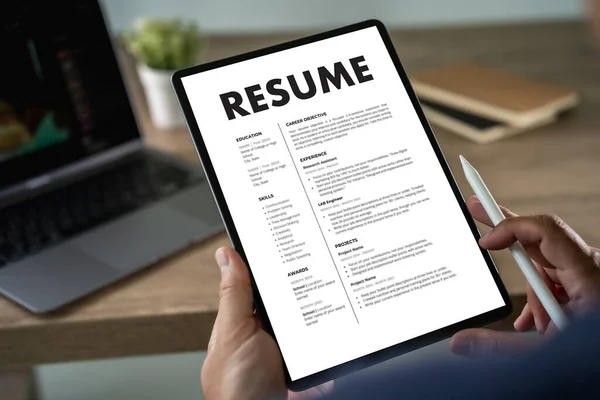Highlights
- Learn how to structure your occupational therapy resume with crucial sections, such as contact information, summary/objective, experience, skills, and education.
- Understand what recruiters are looking for in an occupational therapy resume.
- Explore the required clinical, technical, and soft skills for occupational therapy assistants to match job requirements effectively.
- Access sample resumes for entry-level and senior occupational therapy positions.
You'd think landing an OT job would be a breeze with the increasing number of patients. However, finding a quality OT position is quite challenging. You need exceptional qualifications, a wide professional network, and strong experience—or at least a resume that effectively showcases your strengths.
As a busy medical professional, you don't have time to search the internet for resume-writing tips. That's why we've compiled the ultimate guide to writing an occupational therapy resume you'll ever need.
Occupational Therapy Resume Sections to Answer Recruiters' Checklists

- Header: Ensure your contact details are easy to find and provide a quick look at your latest work portfolio.
- Summary or Objective: Briefly overview your career highlights, goals, and ambitions.
- Experience: Match your work history with the job requirements and highlight your achievements.
- Skills Section(s): List all your skills and talents relevant to the Occupational Therapist role.
- Education and Certifications: Fill any gaps in your experience and demonstrate your dedication to the field.
What Recruiters Want to See on Your Occupational Therapy Resume?
- Education and Credentials: A Master's degree in Occupational Therapy and necessary certifications or licensure (e.g., NBCOT).
- Experience: Hands-on work with diverse populations in various settings (e.g., pediatric, geriatric, inpatient, outpatient).
- Skills in Treatment Plans: Creating and implementing personalized treatment plans based on patient assessments.
- Knowledge of Equipment and Technology: Familiarity with current rehabilitation equipment, assistive devices, and technology used in occupational therapy.
- Interpersonal and Communication Skills: Strong skills in teamwork and patient/family education, with experience in interdisciplinary collaboration.
Note: Looking for local employment opportunities? Yulys is your go-to platform for finding jobs in your community.
What Skills are Required for an Occupational Therapy Assistant Resume?

Clinical Skills
- Exercise Physiology
- Exercise Science
- Patient Assessment
- Patient Documentation
- Treatment Plan Development
- Treatment Techniques
Technical Skills
- MS Excel
- MS Word
Soft Skills
- Adaptability
- Analytical Skills
- Teamwork Skills
- Communication
- Critical Thinking
- Decision Making
- Interpersonal Skills
- Leadership
- Problem-Solving
- Time Management
How to Pick the Best Skills for Your Occupational Therapist Resume?
- Write down all your soft, hard, and technical skills.
- Identify the skills the employer wants.
- Highlight the skills from the job offer in your list.
- Choose up to 10 of your strongest skills for the key skills section.
- Mention some in your resume profile and integrate others into your job descriptions.
Note: Streamline your hiring process with Yulys' quality staffing services. Our platform connects you with top-tier candidates. Experience the difference today!
Tips for Writing an Occupational Therapy Resume in 2024

- Length: Keep your resume concise, focusing on the most relevant information. Aim for one to two pages.
- Design: Use a clean, professional design that is easy to read. Avoid excessive colors and fancy fonts. Stick to a simple, modern layout.
- Format: Utilize a reverse-chronological format, highlighting your most recent experience first. This helps employers quickly see your career progression.
Essential Sections for Your OT Resume
- Contact Information: Include your name, phone number, email address, and LinkedIn profile link at the top of your resume.
- Objective/Summary: Provide a brief overview of your skills and objectives as an OT.
- Professional Experience: Highlight your previous employment in the OT field using the Context-Action-Result (CAR) framework.
- Education: List your educational background, including relevant degrees and certifications.
- Licenses and Certifications: Include any licenses or certifications you hold, such as Certified Occupational Therapist Assistant (COTA) or Registered Occupational Therapist (OTR).
- Skills: Showcase relevant OT skills, such as assessments, treatment planning, and patient evaluation.
- Professional Associations: Mention any memberships in OT-related organizations to demonstrate your commitment to professional development.
- Optional Sections: Consider adding sections like Publications, Research Experience, or Volunteer Work if they enhance your OT qualifications.
Using the CAR Framework to Describe Your Experience
#1 Context
- Context: Developed and implemented individualized treatment plans for children with developmental delays.
- Action: Conducted thorough assessments, created goals, and delivered therapy sessions to promote motor skills development.
- Result: Achieved significant improvements in fine and gross motor skills, enhancing overall functionality and quality of life for the children.
#2 Context
- Context: Collaborated with a multidisciplinary team to provide comprehensive care for adults with neurological disorders.
- Action: Administered various assessments, developed customized treatment plans, and conducted therapy sessions targeting cognitive and physical functioning.
- Result: Enabled patients to regain independence in daily living activities and improve overall cognitive function, enhancing their quality of life.
#3 Context
- Context: Assisted seniors in an assisted living facility to maintain and restore their optimal level of independence.
- Action: Conducted comprehensive evaluations, designed tailored interventions, and provided ongoing support to promote activities of daily living.
- Result: Facilitated increased functional abilities and enhanced overall well-being among the elderly, contributing to their ability to age in place.
Note: Maximize your recruitment budget with Yulys. Post jobs for free and access a wide pool of talented job seekers!
What is the Difference Between an Occupational Therapy Cover Letter and a Resume?
- Purpose
Cover Letter: Introduces you to the employer, explains your interest in the position, and highlights why you are a suitable candidate.
Resume: Provides a detailed overview of your professional qualifications, including education, work experience, skills, and certifications.
- Content Focus
Cover Letter: Personalized to the specific job and employer, explaining your interest and summarizing key qualifications with examples.
Resume: General document listing detailed qualifications, experiences, and skills.
- Tone
Cover Letter: More conversational and enthusiastic, conveying a personal connection to the job and organization.
Resume: Formal and factual, focusing on presenting information clearly and succinctly.
- Personalization
Cover Letter: Tailored to the specific job and employer.
Resume: Generally the same for all job applications, with possible slight modifications for different positions.
- Length
Cover Letter: Typically one page.
Resume: Typically one to two pages, depending on experience level.
Note: Get hired faster than ever with Yulys! Browse our extensive listings of jobs hiring immediately and find the perfect fit for your skills and experience!
Occupational Therapy Resume Examples for Entry and Senior Level

Here we provide you with the occupational therapy resume sample for entry-level and senior-level positions:
Entry-Level Occupational Therapy Resume
[Your Name]
[Your Address]
[City, State, Zip Code]
[Your Phone Number]
[Your Email Address]
Objective:
Motivated and compassionate recent graduate with a Master's degree in Occupational Therapy seeking to leverage clinical rotations and coursework experience to contribute positively to a dynamic healthcare team.
Education:
Master of Occupational Therapy, [University Name], [City, State], Graduated [Month, Year]
Bachelor of Science in Health Sciences, [University Name], [City, State], Graduated [Month, Year]
Clinical Rotations:
Pediatrics: [Name of Facility], [City, State], [Month-Year]
Geriatrics: [Name of Facility], [City, State], [Month-Year]
Mental Health: [Name of Facility], [City, State], [Month-Year]
Skills:
- Proficient in conducting assessments and developing treatment plans
- Knowledgeable in various therapeutic modalities and adaptive equipment
- Excellent communication and interpersonal skills
- Ability to work collaboratively in multidisciplinary teams
- Strong organizational and time-management skills
Certifications:
CPR Certification (American Red Cross)
Professional Affiliations:
Member, American Occupational Therapy Association (AOTA)
Experience:
(If applicable, include any relevant part-time jobs, internships, or volunteer experiences)
Senior-Level Occupational Therapy Resume
[Your Name]
[Your Address]
[City, State, Zip Code]
[Your Phone Number]
[Your Email Address]
Objective:
Experienced and dedicated occupational therapist with over 10 years of experience in various clinical settings, including pediatric, geriatric, and mental health. Seeking a senior-level position where I can utilize my leadership skills and expertise to enhance patient care and mentor junior therapists.
Education:
Master of Occupational Therapy, [University Name], [City, State], Graduated [Month, Year]
Bachelor of Science in Health Sciences, [University Name], [City, State], Graduated [Month, Year]
Certifications:
Registered Occupational Therapist (OTR)
CPR Certification (American Red Cross)
Professional Experience:
Senior Occupational Therapist, [Name of Facility], [City, State], [Month-Year] - Present
Occupational Therapist, [Name of Facility], [City, State], [Month-Year] - [Month-Year]
Occupational Therapist, [Name of Facility], [City, State], [Month-Year] - [Month-Year]
Key Responsibilities and Achievements:
- Led team in implementing evidence-based practices, resulting in improved patient outcomes.
- Developed and conducted in-service training sessions for staff on new treatment techniques and equipment.
- Collaborated with interdisciplinary team members to provide comprehensive patient care.
- Mentored and supervised occupational therapy students and junior therapists.
Skills:
- Advanced proficiency in assessment, treatment planning, and intervention implementation
- Strong leadership and team-building abilities
- Excellent problem-solving and decision-making skills
- Effective communication with patients, families, and healthcare professionals
- Ability to adapt to diverse clinical environments and patient populations
Professional Affiliations:
Member, American Occupational Therapy Association (AOTA)
Member, [State] Occupational Therapy Association
Pro Tip: Save time and ready your resume in just 5 minutes with Yulys resume builder. It's quick, easy to use, and offers ready-made content you can add with just one click.
Summary
Writing a compelling occupational therapy resume requires attention to detail, strategic skill selection, and a clear understanding of recruiters' expectations. By following the provided guidelines, you can highlight your qualifications, experience, and skills to stand out in a competitive job market. Whether you're an entry-level candidate eager to start your career or a seasoned professional seeking new opportunities, a well-crafted resume will show your potential and expertise.
